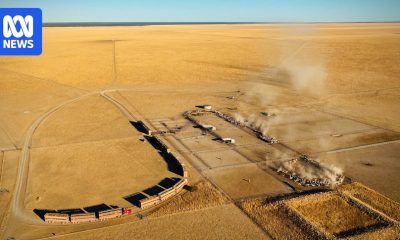Health
Managing trauma during a pandemic – National Indigenous Times
Kym Marsden discusses trauma and Post Traumatic Stress Disorder in her monthly mental health column.

Kym Marsdens (prev. Friese) monthly mental health column aims to help anyone suffering from any mental health concerns. If this article raises any issues for you please contact the resources at the bottom of this article.
How many of you throughout this pandemic have attempted to consciously try to dismiss your distress and accompanying negative emotional reactions in a bid to preserve hope and ensure forward momentum?
I know I have, often daily, and then I felt a sense of relief during recent lulls in restrictions across the country, providing to some of us a short-lived reprieve which was followed by a flood of headlines of a new outbreak in Melbourne.
We watched as this event re-triggered the lockdown of suburbs, borders and building blocks. Again, we watched helplessly taking in the visions of desperate faces, individuals attempting to flee lockdown and frantic pleas on posters placed in windows of Melbournes COVID Towers.
I experienced shock and disbelief: How, why, imagine the horror those poor souls would be experiencing.
As such, I felt that focusing on trauma and, in particular, Post Traumatic Stress Disorder (PTSD) was appropriate for this months article.
Phoenix Australia defines Post Traumatic Stress Disorder (PTSD) as a set of reactions that can occur after someone has been through a traumatic event. The chance of developing PTSD depends on the type of event experienced, but about 5 to 10 percent of Australians will suffer from PTSD at some point in their lives.
Upon being confronted with a traumatic incident, we can often overthink it, attempt to block it or fail to process it. It varies for all of us and creates a perfect breeding ground for trauma and the development of coinciding mental health concerns such as depression or anxiety.
Its normal for individuals exposed to trauma to develop symptoms of PTSD.
This can occur hours, days or weeks after the event. As such, it is imperative to seek help as needed within the first few hours, days and weeks following a traumatic event and may include talking to loved ones or accessing a helpline.
Unfortunately, but not surprisingly, those of us who have trauma histories, for example survivors of child abuse, natural disasters or combat veterans are likely to be more vulnerable to the effects of being exposed to new trauma.
Symptoms to be on the lookout for may include but are not limited to:
- Flashbacks, intrusive and distressing recollections of the event resulting in reliving that moment
- Triggers trauma is often triggered by sight, sound or smell. For example, during a traumatic experience, you may have smelt a certain smell. After the trauma, exposure to this scent may trigger similar intense feelings such as anger or anxiety
- A range of negative emotions such as intense sadness, isolation, anger or guilt
- Avoidant behaviours purposefully avoiding places, people or events that provoke feelings or memories of the trauma.
Its important that you consult your GP if symptoms increase in intensity or persist longer than a month, allowing for relevant testing, treatment options and referral if required to the relevant mental health professionals.
As were all individual, be mindful that your healing journey will differ from otherssimilar to grief and loss. There are no set timeframes, right or wrong ways to go about it!
Lastly, show yourself the kindness and compassion you bestow on others, as healing doesnt guarantee your symptoms will disappear completely. Instead, it means symptoms will likely lessen and be more manageable allowing for you to reclaim your life.
If you or anyone you know is struggling with mental ill-health, call or visit the online resources below:
By Kym Marsden (prev. Friese)
Kym Marsden is a Kamilaroi woman and Accredited Mental Health Social Worker with over 19 years experience in Mental Health and Community Services. Her qualifications include BA Health Ageing and Community Services, Masters Social Work, Dip Counselling, Dip Community Services (AOD and Mental Health), and Cert IV Training and Assessment.

-

 Noosa News11 hours ago
Noosa News11 hours agoConsolidated Pastoral Company buys Beetaloo aggregation in historic deal worth more than $300m
-

 Business22 hours ago
Business22 hours agoWhat Warren Buffett’s latest portfolio moves say about the market
-

 General18 hours ago
General18 hours agoWotjobaluk Nations Festival marks landmark native title recognition
-

 General23 hours ago
General23 hours agoRabbi Eli Schlanger killed in Bondi terror attack
